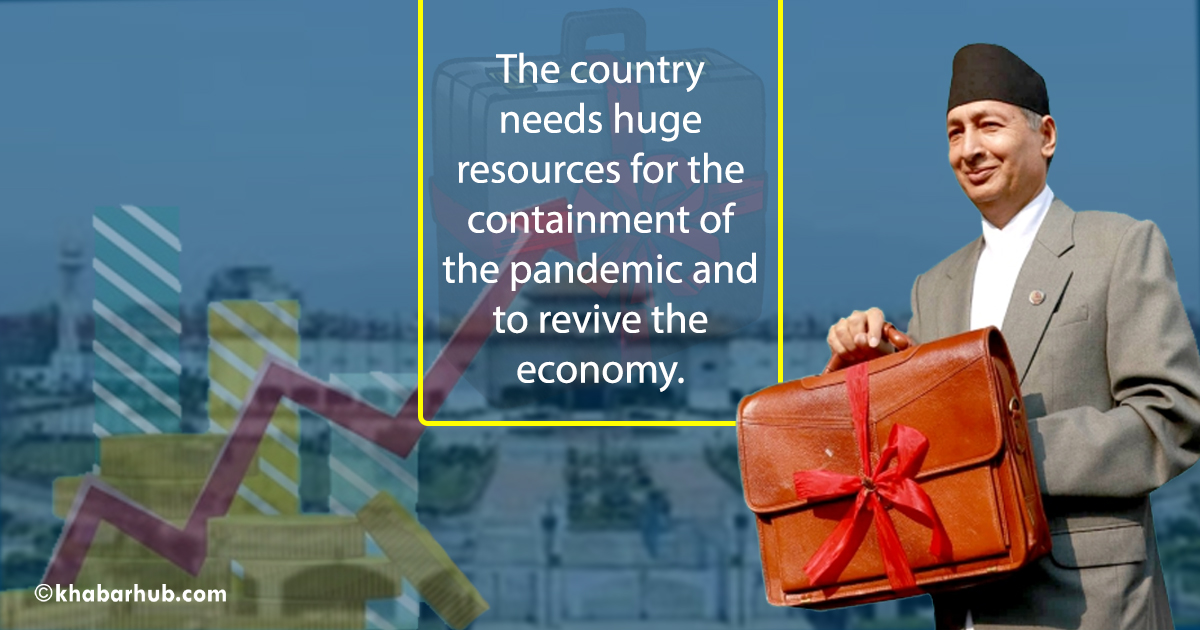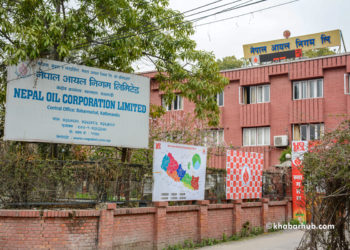With much emphasis on the containment of the COVID-19 pandemic and health infrastructure to revive and upscale the economy, Finance Minister Yuvaraj Khatiwada presented the budget of Rs. 1,474.64 billion for the Fiscal Year 2020/2021 on May 28, 2020.
The budget presented at the joint session of the House of Representatives and National Assembly has set an ambitious GDP growth target of 7 percent.
With proportionately higher regular expenditure, the gap between revenue and expenditure has been widened compared to the previous budget. Revenue collection target (Rs. 889.6 billion) does not cover even all regular expenditures.
The target to collect domestic loan worth of Rs. 225 billion seems realistic and is kept within the limit (5 percent of GDP) because excessive dependence on the domestic loan may create a crowding effect in the economy or will limit the investible funds for the private sector.
Public Expenditure Review Commission reported that nearly 30 percent of regular expenditure can be saved by stopping unproductive expenditure. But the government completely ignored the suggestions given by the Commission.
The government plans to collect foreign grants and loans of Rs 60.52 billion and Rs. 229 billion respectively which is rather unrealistic.
Since the Covid-19 pandemic has disrupted all the advanced and developed economies, they need a large chunk of resources to revive their economies. Similar is the case as regards to aid from multilateral sources.
Continuity in Unnecessary and unproductive Expenditure
The country needs huge resources for the containment of the pandemic as well as to simultaneously revive the economy.
Likewise, the prospect of collecting the required revenue seems rather dim both from internal and external sources.
Restructuring of public expenditure and strict adherence austerity measures is today’s need to release the fund for the most urgent uses.
Public Expenditure Review Commission reported that nearly 30 percent of regular expenditure can be saved by stopping unproductive expenditure. But the government completely ignored the suggestions given by the Commission.
Numerous resource-draining Commissions/Boards and unproductive development projects are in place. Duplication of government functions amongst the ministries and across the different levels of governments have also increased the expenses.
The allowances given to the civil servants are scrapped while that of Prime Minister and ministers are kept intact.
All the regional governments also followed the same trend in their respective budget. The most-criticized district development fund given to each lawmakers has not been dropped. Unproductive programs have been continued.
Obnoxious Taxes
The government decision to raise taxes on import of electric vehicles (80 percent customs duty and 20 percent excise duty) is highly obnoxious as it contradicts the government’s policy to promote the electrification of transportation and increasing electricity consumption per person to 700 units within four years.
The massive use of electrical vehicles confers double benefits; firstly it improves trade balance decreasing the import of petroleum products and 2ndly it reduces vehicular pollution. In almost all the countries including India, EVs are highly subsidized and all taxes are waved.
Petroleum product tax is raised by Rs. 10 per liter. Petroleum product is heavily taxed in Nepal (almost 55 percent: inclusive of all taxes: road tax, customs duties, and infrastructure and pollution taxes).
This is one of the reasons that make Nepal a high-cost economy with very high transportation cost. Similarly, chemical fertilizers and seeds are taxed at 5 and 10 percent respectively.
This contradicts government policy to prioritize agricultural sector development with provision subsidized agricultural inputs.
Ambitious GDP Growth Target
The GDP growth target of 7 percent is also over-ambitious. How can we expect the continuation of the average growth rate we achieved during the last five years also for 2021?
Longtime inactivity during more than 3 months lockdown has completely disrupted the entire economy and even after lockdown is removed the situation is not back to normal.
The future is quite unpredictable than anticipated. With several new cases increasing day by day one can imagine the worst condition is yet to come which is most likely.
An official estimate shows about 20 to 30 percent of Nepalese migrant workers had lost their employment and about 300,000 may come back immediately as soon as the international air link is restored.
If this situation continues for a longer time, the economy may witness even negative growth. According to IMF, the Covid-19 pandemic has had a more negative impact on activity in the first half of 2020 than anticipated by the World Economic Outlook, and recovery is projected to be more gradual than previously forecast.
Based on the data for eight months of the current fiscal year, the CBS projected economic for 2020 is 2.3 percent.
And it is also assumed that the situation will be normalized after June or July. The pandemic, however, has had a more adverse impact than anticipated.
Increased unemployment: The pandemic has created mass unemployment. The most vulnerable are informal sector workers constituting about 6 million (NFSS, 2017).
They are in danger of having their livelihood destroyed due to cuts in work hours and losing the job. As per the World Bank estimate, about 30 to 32 percent of the population could slip into the poverty trap in Nepal due to Covid19.
Loss of low paid jobs has driven a mass exodus of migrant workers from cities to the rural areas and also from India.
And it has not stopped yet due to open border and it has become a prime cause for penetrating the virus in almost all the districts of Nepal.
An official estimate shows about 20 to 30 percent of Nepalese migrant workers had lost their employment and about 300,000 may come back immediately as soon as the international air link is restored.
To quote the NRN Association, nearly one million migrant workers may return in the future.
Mass unemployment may create social unrest, crime, insecurity, and vulnerability. Injecting the money at the hands of unemployed people through cash transfer confers double benefits first it smoothens the consumption of vulnerable households and increases the aggregate demand in the economy.
Another measure which can be employed for a short-term period is expanding the outreach of existing food for work program at the local levels.
Similarly, the returnees’ migrant workers can also be employed in infrastructural development programs at the local levels with short refresher training. The local government is best placed in identifying the targeted population for such programs.
According to the finance minister, about 600,000 to 700,000 jobs will be created in the upcoming year with the implementation of different programs. But no detailed work plan has been developed in this context.
In a bid to addressing the escalating unemployment problem, it is necessary to design strategic plans for short term, medium-term and long term with proper benchmarking.
The Prime Minister Employment Program has been given continuity and its budget has been doubled from Rs. 5.1 billion to Rs. 11.60 billion.
Though the program is designed thoughtfully for generating employment, it completely failed to achieve its mission and large scale misuse of funds is reported.
The role of the private sector in employment generation is ignored. The promotion of the private sector helps to create millions of jobs.
Stimulus Packages
Tourism and hospitality, transportation, along with the social sector are not functional yet. The majority of the SMEs are in standstill position and many of them are on the verge of collapse.
Covid19 has had a more adverse effect than expected and recovery has delayed. The majority of industries are operating at only 30 to 35 percent of their capacity.
The vibrant and strong private sector is the foundation of the national economy; a major source of employment opportunities and government revenue.
But with the Covid19 pandemic outbreak and consequent lockdown for more than three months the private sector has been devastated.
With that, the country has lost more than Rs.168 billion according to a preliminary estimate of NRB. According to a study, tourism and hospitality have lost Rs. 34 billion within the last months due to loss of transaction.
The tourism and hospitality sector had made huge investments to increase facilities targeting the increased number of tourist arrivals during the Visit Nepal Year 2020.
To revive and upscale the recovery of ailing economy, the government needs to support in terms of different fiscal and monetary packages.
India has announced a relief package worth of IRs. 1.7 trillion equivalent to 10 percent of its GDP. It is one of the biggest packages in the world second after that of the USA (13 percent of GDP.
The budget 2021 has also made provision of stimulus packages of Rs. 150 billion which is four percent of GDP.
Measures are: subsidized loan to starting a new business, 2 percentage points reduction in interest, and raised the refinance fundraised to Rs. 100 billion.
Tourism, agriculture, and SMEs will be provided with a refinance facility at a 5 percent interest rate. Other provisions are to defer tax payments during the lockdown period, waiver of taxes, import tax subsidy to export-oriented industries, etc.
These are only the short term measures, not adequate to address long term economic effects. The business community is demanding a big package of at least 5 percent of GDP adequate to push the economy to the recovery path.
Restructuring the existing bonds
The tourism and hospitality sector had made huge investments to increase facilities targeting the increased number of tourist arrivals during the Visit Nepal Year 2020.
They are not in a position to pay their interest and installments. Similarly, SMEs are also undergoing the same crisis.
Strengthening the existing monitoring and evaluation units of each ministry and department is important. The introduction of a performance-based evaluation system and strict adherence to it is the need of today.
The government is yet to address the problems of SMEs. Since the government has raised the refinance size, only the big houses can have access to it.
Less than 50 percent of the industries are operating and are running at 25 to 35 percent of their total capacity. And only 30 percent of their employees are working.
This has increased the operating cost. They are not in a position to pay the loan installment in due date. SMEs are in the worst condition and many of them on the verge of collapse.
Restructuring of the loan payment period for 2 to 5 years is necessary for all ailing industries. Loan rescheduling is restructuring the term of the existing loan in order to extend the repayment period, which means a delay in due date through extending the payment period.
Refinancing facility
The Nepal Rastra Bank (NRB) needs to raise the refinancing fund and access the fund to most adversely affected business enterprises particularly tourism and hospitality, transportation, SMEs, agriculture, and the export-oriented industries.
The government should do facilitation and all the complicated processes which are to be fulfilled in getting the fund under it should be removed. Loan processing should be done in fast track mode.
Reduction in interest and tax rates
The reduction of interest by 5 percentage is another demand of the business community.
It is also necessary to provide collateral-free loans and more subsidy in interest to SMEs to sustain the business and save the jobs of millions. Reduction in corporate income tax also relives the industries during the crisis time.
Modernization and commercialization of agriculture
Modernization and commercialization of agriculture can be the best alternatives to support the vulnerable population and make the country self-reliant in food.
Budget priorities modernization and commercialization agriculture through integrated packages of subsidized inputs: seeds, fertilizers, technology and easy access to the credit and marketing facilities.
The concept of a land bank is introduced. The vulnerable households will be provided with priority access to unutilized public land.
Rs 41.4 billion has been allocated for agriculture development, which constitutes only 4 percent of the total budget.
It clearly shows the mismatch in programs and budgets like in the previous budgets. The role of the private sector is ignored in the context of agricultural development.
The local level government is better placed to identify the vulnerable and support them. They should be made more functional and be strengthened to implement the program more effectively.
Tips for effective implementation of the programs
If the programs are not implemented effectively with a high level of commitment, the intended result cannot be realized.
Reforms in the implementation mechanism is necessary. Regular monitoring (output and process monitoring of the program implementation) should be initiated.
Strengthening the existing monitoring and evaluation units of each ministry and department is important. The introduction of a performance-based evaluation system and strict adherence to it is the need of today.
There should be a proper coordination and cooperation among different ministries and departments and across the different levels of the governments.
Monetary policy should be geared towards fulfilling the objectives of the budget, or there should a perfect coordination between budget and monetary policy.
To ensure ample liquidity in the market the upcoming monetary policy needs to reduce the cash reserve ratio, raise credit to capital and deposit ratio along with these ensure adequate refinancing fund with the central bank.
All possible measures should be employed to promote domestic investment and attract FDI.









Comment